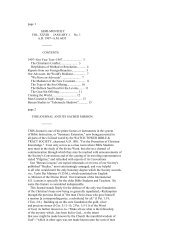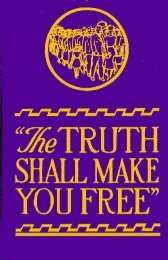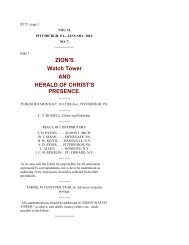The Watchtower Society and John and Morton Edgar - A2Z.org
The Watchtower Society and John and Morton Edgar - A2Z.org
The Watchtower Society and John and Morton Edgar - A2Z.org
- No tags were found...
Create successful ePaper yourself
Turn your PDF publications into a flip-book with our unique Google optimized e-Paper software.
Babylon <strong>and</strong> t001i the Chafdean viewpoint of the thirdyeas of Jehoinliiin's selot~onship with 13abyIon. <strong>The</strong>e~ents ~rliich the11 took place agree with the Scripturalrecord of the taking of some of the Temple vessels <strong>and</strong>of ma,~iy Je\\ s eapt~~e illto Babylon in 617 B. C., elevengea1.s before the desolation;low them in doubtful matters .is to fall into error <strong>and</strong>entaiiglement.In the same year (617 B. C.), three months later,toolc place the second part of the initial captiilty ofthe Jews, under Jehoiacllin, to Babylon. (Jesemrah 52:28) This is described by Josephus as follows:* WATCH TOWER"But terror seized on the k~ng of Babj Ion, who had giventhe Irigclom to Jehoinchln <strong>and</strong> that immed~ately; he wasafraid tlmt he should bear him n grudge, because of hisk~lling of his father, <strong>and</strong> thereupon sIlotlld make the countryrevolt for him; l~heref~~resent a11 army <strong>and</strong> besiegedJelioiachin in Jerusnlem; but because he was of agentle <strong>and</strong> just disposition, he did not desire to see the citye~~da~lgered on his account, but he took his mother nndkindred, <strong>and</strong> delivered them to the co~nrn<strong>and</strong>ers sent bythe king of Babylon, <strong>and</strong> accepted of their oaths, thatneither should they suffer any harm nor the city, wll~chagreement tliey did not observe for a single year; for theking of Babylon did not keep it, but gave orders to hisgenerals to take all that were in the city captives, boththe youill <strong>and</strong> the Il<strong>and</strong>icraP men, <strong>and</strong> bring them boundto him; their number was ten thous<strong>and</strong> eight hundred <strong>and</strong>tllirty-tn o ; as also Jeboiachm, <strong>and</strong> his mother <strong>and</strong> friends;<strong>and</strong> when they were bbrought to him, he kept them incnstndy. <strong>and</strong> appointed Jehoiaddn's uncle Zedekfnh to bek111~".--41it. S, 8: 1.<strong>The</strong> Biljle record of this is in 2 Kings 24: 10-17;2 Chronicles 36 : 9, 10 ; <strong>and</strong> Jeremiah 52 : 28.After the denarture of Jehoiachin <strong>and</strong> the Jewishcaptives to ~ab~lon, some false prophpta among themat Babylon kept the minds of the captive3 in unrest bypredlctlllg only a brief captivity. To quiet this unrestJeremiah, in 617 13. C., in a letter (Jeremiah 29: 1-23)counseled the captives to settle down <strong>and</strong> make themselvesas comfortable as posslble in anticipation of aIong period away from home, because the seventy years-to begin in 606 B. C.-were surely to be rtccompllshedat Dabylon. (Jeremiah 29: 10) No one knew then whenthe ievclity years were to begin. This was not understoodFIRST CAYTIVIT,Y BEGAN 617 B. C.<strong>The</strong> record of tllc historian Josepl~us of the capt~vitleoof the Jc~rs in G17.B. C.-the first of the captivities- by Damel till the first year of Darius. (Dan~el 9: 1,2)is as follo\~-s :It is asserted that Jeremiah's letter (617 13. C.) marlied"Socr- :L l~ttle time afterwards [GI7 B. C.], the king of the beginning of the "seventy years"; but this is notE,lb>lon made nu espedhon against Jehoinkim, \\-horn he the case. As a matter of fact, the Prophet had uttered~ece~rell [~nto:lie c~ty], <strong>and</strong> this out of fear of the fore- this very warn~ng in 625 B. G. (Jeremiah 25: 1-38;preclictlo~ls of th~s prophet [Jeremiah], as supposirlgthat he should snffer noth~ng that wns terrlble, becnuse he 29: 11,12), eight years before there was any captivityneither shut the gztes nor fought ag:~inst 111111; yet, when at all; for Judea <strong>and</strong> Jerusalem were not molested inhe was come into the c~ty, he did not observe the coveuunts 625 B. C. nor until four years later, when Jehoiakim,~111cIl he had nlnde, but he slew such as were in the flower under fear of Nebuchadnezzar's threats, became a tribuoftheir age, <strong>and</strong> such as were of the greatest d~gn~ty, to- tary vassaI to BabyIon.gether with their king Jeholnk~m, whom he comm<strong>and</strong>ed tobe tl~rotvn before the walls, without any burial, <strong>and</strong> made <strong>The</strong> various nations also were to serve Babylon sevhisson Jeho~schm k~ng of the country aud of the city: he enty years, but the servitude of different nations beganR~SO took the pr~ncipal persons in dignity for capttves, at different times, from Ph~listia in 625 down to Tyrethree thousnnrl in number, <strong>and</strong> led them away to BtlbyIon,nmong rvhom \vns the prophet Ezeklel, who was then butin 606 (or 605) 13. C., tlie latter city's preliminaryyoung."-Ant. S, 6: 3.siege beginning (618 B. C.) thirteen years before its'<strong>The</strong> Bible record of this captivity at the close of fall (GO5 B. C.) according to the article on Nebwhad-Jehoialiim's reign is given in 2 Kings 24: 2-6 ; 2 Chroni- nezznr in "Smith's Bible Dictionary". <strong>The</strong> predictedcles 36 : 6 ; Daniel 1 : 1, 2 ; <strong>and</strong> Jeremiah 22 : 13-19. In seventy years' servitude of all the nations was, however,this inattcr many writers on this s~lljject have been mis- prachcally coincident with the se~ent years' desolationled by atteinptmg to harmonize thcse events with unre- of Juclea, though some served more than seventy years.liable pagan records. <strong>The</strong> pagans in all their affairs No one date prior to GO6 13. C. can be set as meetingn-ere under demoi~~stic influence, <strong>and</strong> to attempt to fol- all the requuements of the prophecy of Jeremiah 25:13-28. A seventy-jeax perlod upon Tyre had been prophesiedby Isaiah (23 : 15-18) ; <strong>and</strong> as this agrees in termswith the Jeremiah prophecy (Jeremiah 25 : 11, 22), these~~enty years' servitude of Tyre to Babylon could nothave begun earlier than 606 or 605 B. C. Any closeexam~~iation then of the facts shows that not even theprophecy of seventy years' servitude or captivity uponthe nations began to be fulfilled on alZ of th~m in 625B. C. nor earlier than GOG B. C. <strong>The</strong> expression ofIsaiah 23: 15 is that "'l'yre shall be f<strong>org</strong>otten seventyyears [as an independent people], a-ccordiag to the daysof one king [kingdom, empire]". Knowing that inprophecy "king" is often used for '%ingdom" (Daniel11 :11-14, etc.), the "one king" evidently refers to theseventy-year dominion of Babylon from 606 to 536 B. C.No other explanation of these passages meets all theconditions of prophecy <strong>and</strong> fulfdlment.A further dlfticulty comes to light in comparingDaniel 1 with Daniel 2. In Daniel 1 the statement isthat the four Hebrew lads were given three years trainingbefore presentation to the king. (Daniel 1 : 5, 18-20)In Daniel 2: 1 it is stated that Daniel waa broughtbefore the king <strong>and</strong> revealed <strong>and</strong> explained the imagedream in Nebuchadnezzar's second year, which wouldthus have been a year or two before they were present-tlto the king m recorded in Daniel 1: 181 <strong>The</strong>
















